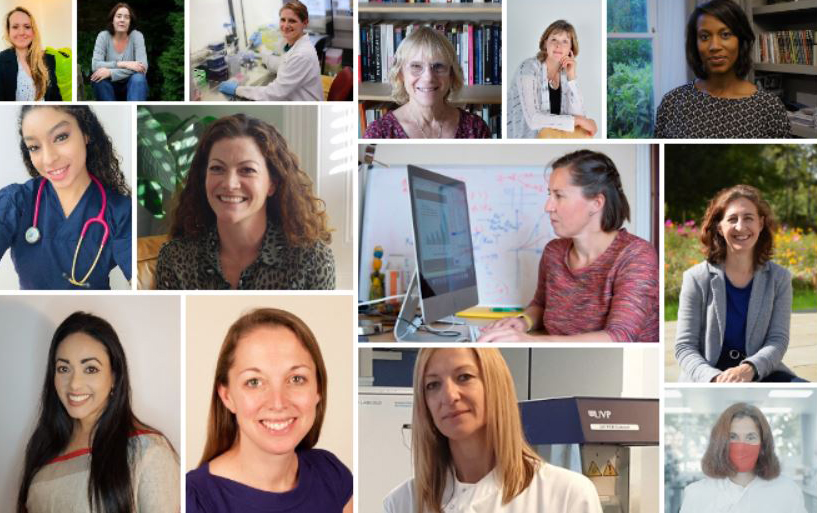The Bristol women tackling COVID-19
Women from across our University community have been using their expertise to tackle the pandemic, from carrying out world-class research to helping on the frontline of the NHS.
To mark International Women's Day 2021, we meet inspirational female staff and students to find out how the virus has transformed their work and studies. We also discuss what it's like being a woman working in their field and discover who's inspired them.
You can read Q&As with each woman on the #BristolUniWomen blog.

Did you know that Professor Sarah Purdy, Pro Vice-Chancellor for Student Experience, has also been working as a GP? Read her thoughts on balancing that with managing the University's response to the ever-changing situation.
Fifth year medical student Chanelle Smith describes the 'surreal and humbling experience' of working in critical care wards and reflects on how the slower pace of live created by the pandemic has led to some surprising positives.
Aside from those directly working in the NHS, researchers at the University have been at the centre of world-leading projects to further our knowledge of the virus and how it spreads.
Many are part of the Bristol UNCOVER - the University's COVID-19 emergency research group - which was formed a year ago to mobile expertise from across the University to find ways to overcome the disease.
Dr Laura Rivino had only been at the University six months at this point, having just moved from Singapore. She recalls the rapid switch from researching dengue virus to understanding the long-term immunological effects of coronavirus, and how inspiring it is to be working with immunologists from across the UK.
Dr Ellen Brooks Pollock, an expert in the mathematical modelling of infectious diseases, has been called upon to advise the government. She reflects on the late nights spent coding with her husband Leon Danon, a fellow modeller who is also on SPI-M (the SAGE modelling subgroup), once their children had been put to bed. Ultimately, their research was used by SAGE and policy makers to shape policies around the reopening of schools.
How the virus spreads in schools is the focus for Professor Caroline Relton, who is working on a major research project to track infections in Bristol schools. She shares her insights on the challenges of working in an ever-changing environment, but also the rewards of working closely with school leaders and the city council to help schools operate during such uncertain times.
SAGE member Professor Lucy Yardley received an OBE in the Queen's Birthday Honours last October for her contribution to the COVID-19 response. She’s not only advised the government but has also developed the 'Germ Defence' web app, which helps users adopt better infection control in the home.
Biochemist Professor Christiane Berger-Schaffitzel's team, which she leads with her husband Professor Imre Berger, discovered a 'druggable pocket' within the spike protein which is occupied by linoleic acid (LA). She explains how they’re using this exciting breakthrough to work on a new antiviral treatment for COVID-19.
This is just one of the 86 projects funded by the University's Elizabeth Blackwell Institute (EBI) in the past year. Professor Rachael Gooberman-Hill, EBI's Director, admits to being 'astounded' by the research effort of colleagues across the University. Her own research has sought to understand what people think of science and scientists, finding that trust is pretty high overall.
The impact of the pandemic on young people’s mental health has been the focus for Dr Rebecca Pearson, whose research uses data from the Children of the 90s study. Her work showing that young adults, especially those in their 20s, were having a spike in anxiety, contributed to the Government’s changes in policies around support bubbles for people living alone. All while juggling being a single mum with two teenage daughters!
Law PhD student Sophie Chester-Glyn has also been juggling parenthood with her studies and running Co-Produce Care, a non-profit organisation which supports people in social care. In addition to providing advice to those working in the sector, Sophie has presented to the Government's Social Care Sector COVID-19 Support Taskforce about how the pandemic is affecting people of colour working in social care.
A rise in domestic abuse due to the pandemic led researcher Dr Emma Williamson to join forces with Women’s Aid to examine the true impact. She discusses how the data they uncovered influenced Government policy and how she cheered when Prime Minister Boris Johnson specifically outlined how those suffering from domestic abuse were exempt from restrictions when he announced the second lockdown.
Dr Lucy Selman carries out research into end-of-life care and bereavement – an issue sadly so pertinent to many. She's carrying out the first UK-wide survey looking and bereavement during the pandemic and organising a second Good Grief Festival - a virtual free event at the end of March exploring the many faces of grief.
With anxiety and stress soaring due to lockdown restrictions, psychologist Dr Nilu Ahmed's expertise has been in demand by the media. As her work also looks at race and inequality, she's been working with minority language press and community organisations to highlight the importance of staying well and challenging misinformation about COVID-19.
The UK has seen big ethnic differences in COVID-19 infections and deaths – a topic which Dr Saffron Karlsen looks at from a socioeconomic perspective. She reflects on how the pandemic, coupled with George Floyd’s death last summer, has finally led to the issue being discussed openly, bringing 'real hope for positive, lasting change'.